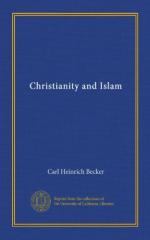The problem of reconciling the attributes of God with the dogma of His unity was solved with no less subtlety. The mere idea that a multiplicity of attributes was incompatible with absolute unity was only possible in a school which had spent centuries in the desperate attempt to reconcile the inference of a divine Trinity with the conception of absolute divine unity.
Finally, the third question, “Was the Qoran, the word of God, created or not?” is an obvious counterpart of the Logos problem, of the struggle to secure recognition of the Logos as eternal and uncreated together with God. Islam solved the question by distinguishing the eternal and uncreated Qoran from the revealed and created. The eternal nature of the Qoran was a dogma entirely alien to the strict monotheism of Islam: but this fact was never realised, any more than the fact that the acceptance of the dogma was a triumph for Graeco-Christian dialectic. There can be no more striking proof of the strength of Christian influence: it was able to undermine the fundamental dogma of Islam, and the Muhammedans never realised the fact.
In our review of these dogmatic questions, we have met with a novel tendency, that to metaphysical speculation and dialectic. It was from Christendom, not directly from the Greek world, that this spirit reached Islam: the first attitude of Muhammedanism towards it was that which Christianity adopted towards all non-religious systems of thought. Islam took it up as a useful weapon for the struggle against heresy. But it soon became a favourite and trusted implement and eventually its influence upon Muhammedan philosophy became paramount. Here we meet with a further Christian influence, which, when once accepted, very largely contributed to secure a similar development of mediaeval Christian and Muhammedan thought. This was Scholasticism, which was the natural and inevitable consequence of the study of Greek dialectic and philosophy. It is not necessary to sketch the growth of scholasticism, with its barrenness of results in spite of its keen intellectual power, upon ground already fertilised by ecclesiastical pioneers. It will suffice to state the fact that these developments of the Greek spirit were predominant here as in the West: in either case important philosophies rise upon this basis, for the most part professedly ecclesiastical, even when they occasionally struck at the roots of the religious system to which they belonged. In this department, Islam repaid part of its debt to Christianity, for the Arabs became the intellectual leaders of the middle ages.




